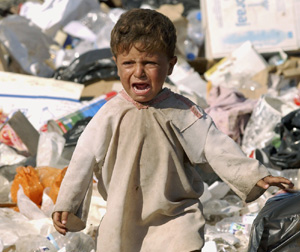|
Iraqis: 'We Are Left
|
 |
|
An Iraqi child cries as he walks through rubbish near his makeshift home in a garbage dump on the outskirts of Baghdad. |
"We believed the U.S. when it said 'Help us get rid of Saddam Hussein and your lives will be better,'" said Baghdad taxi driver Issam Mohammed. "But now we find ourselves occupied by a foreign power taking our resources, and we are left with nothing, not even physical security."
During my two-week visit to Iraq in mid-July, I witnessed firsthand the anger of the Iraqi people. "No electricity, no water, no jobs, no security" was the refrain I heard over and over again.
Indeed, on Aug. 9, just one day after the White House released its rosy 100-day assessment of the Iraq occupation, thousands of Shia Muslims rioted in the streets of Basra. The Shia, a majority in Iraq who had been brutally repressed by Saddam Hussein, were incensed by shortages of gasoline and electricity.
The Bush 100-day report "has nothing at all to do with reality," said Eman Khammas, a veteran journalist and co-director of the newly formed Occupation Watch Center. "I challenge Paul Bremer and George Bush to come out with me to the streets of Baghdad, the streets of Basra, the streets of any Iraqi city and talk to people instead of staying secluded in Saddam Hussein's former presidential palace. They will hear a very different story."
Meanwhile many U.S. soldiers and their families are bristling because of canceled leaves and increasing casualty rates. And the cost of the occupation has jumped to $1 billion per week.
The vacuum of legitimate authority caused by the occupation has unleashed thieves--"Ali Babas" as they are called locally--and destroyed public safety. Nightly gunfire and a spate of kidnappings and rapes have made women afraid to leave their homes. "If I get home safely today, I will open the Koran and give thanks," Maha Naama told me at a Baghdad women's clinic.
The other major complaint is the lack of electricity. The U.S. bombed the gas pipeline that feeds the power stations in Baghdad, a problem now compounded by looters and saboteurs--and suffocating 110-degree heat.
Without fans or air-conditioning, people have trouble working and sleeping. Without refrigeration, their food goes rancid. Without electricity, the water pumps don't work, gas can't be pumped, the traffic lights don't work and the roads are utterly chaotic. The streets are dark at night, making it easier for the thieves.
In addition, hundreds of thousands of Iraqis have been thrown out of work. "The U.S. took our jobs away when they dismissed government workers, the army and the police. We want our jobs back," said an angry protester at a Union of the Unemployed sit-in at the office of the U.S. authorities.
Iraqis are puzzled why the U.S. can bomb a specific building from 30,000 feet in the air, but can't provide Iraqis with security, electricity, water or jobs. Some attribute the chaos to incompetence, arrogance and stupidity. Others are convinced that it is an intentional attempt to consolidate U.S. rule. They cite an Iraqi saying: "if you starve a dog, it will follow its master."
But there is another Iraqi saying: "if you starve a dog, it will bite you." Certainly the increasing attacks on U.S. soldiers indicate that not all Iraqis will follow the U.S. master. "The press covers the armed attacks," said Ms. Khammas of Occupation Watch, "but there is also a growing non-violent resistance movement."
Women are forming organizations like the Iraqi Women's Society to demand safety, decent living conditions and a real democratic transition. Unions, including the new Union of the Unemployed, are demanding jobs and insisting that Iraqi oil be in the hands of Iraqis. Human rights groups are speaking out against abuses by the occupying forces. Independent media groups are testing the waters of free speech.
The U.S. has responded by indefinitely jailing thousands of Iraqis with no charges and no access to lawyers. Iraqi civilians are shot at roadblocks, at protests or just randomly by nervous U.S. troops. Just one Baghdad hospital, Al Kindi, reported 10-20 civilians wounded or killed by U.S. troops every day.
The statue of Saddam Hussein that we saw toppled by U.S. troops on television now has a message to the occupying forces painted in bright red on its base: "ALL DONE, GO HOME."
Medea Benjamin, co-founder of Global Exchange and Code Pink Women for Peace, was recently in Baghdad to help organize the International Occupation Watch Center.
| Month in Review |
|---|
|
August 2010: |
| PAST articles |
Detoit: I Do Mind Empire (USSF Recap) “Bring the War (English) Time for Rebirth: (English) War Weariness, Military Heft, and (English) The Global Military Industrial Complex (English) A Stalled (English) Bush's Iraq “Surge”: Mission Accomplished? Iran: Let's Start with Some Facts Nuclear Weapons Forever (English) Time to End the Occupation of Iraq First-Hand Report from the Middle East (English) Haditha is Arabic (English) A Movement to End Militarism From Soldier to Students Not Soldiers Israel's "Disengagement" U.S. Soldiers Torture: Help Stop Torture — Be All You Can Be: OCTOBER 2006
|
|
War Times/Tiempo de Guerras is a fiscally sponsored project of the |